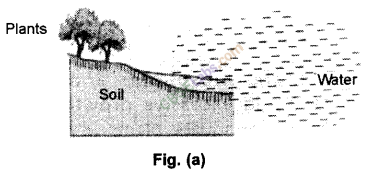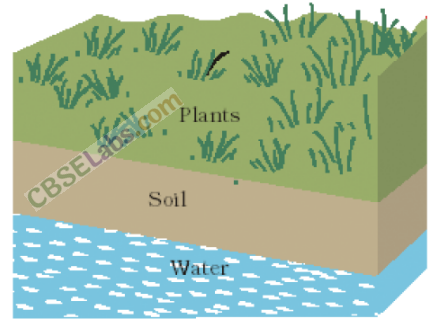NCERT Exemplar Class 10 Science Chapter 16 Management of Natural Resources are part of NCERT Exemplar Class 10 Science. Here we have given NCERT Exemplar Class 10 Science Chapter 16 Management of Natural Resources.
NCERT Exemplar Class 10 Science Chapter 16 Management of Natural Resources
Short Answer Questions
1. List two advantages associated with water harvesting at the community level.
Answer. Two advantages of water harvesting at the community level are:
- Water can be stored during rainy season and can be used when required.
- Groundwater level increases due to recharging of wells.
2. In a village in Karnataka, people started cultivating crops all around a lake which was always filled with water. They added fertilisers to their field in order to enhance the yield. Soon they discovered that the water body was completely covered with green floating plants and fishes started dying in large numbers. Analyse the situation and give reasons for excessive growth of plants and death of fish in the lake.
Answer. Because of the excessive use of fertilisers in the fields, they were carried down to the lake during rains. The fertilisers contain phosphates and nitrates, resulting excessive growth of algae and other aquatic plants which float on water surface. The submerged plants are killed due to shading and insufficient availability of dissolved oxygen resulted in the death of fish.
3. What measures would you take to conserve electricity in your house?
Answer.
- Switch off lights and fans when not required.
- Use of solar radiation for cooking food and lighting.
- Use of fluorescent tubes or CFL.
- Use of solar water heating system during winters.
4. Although coal and petroleum are produced by degradation of biomass, yet we need to conserve them. Why?
Answer. Coal and petroleum are rich sources of energy and it takes millions of years for their formation. As these resources are being consumed in ever increasing amount in industry, transport, kitchen, etc’ and utilized at a much faster rate than their formation, they will be exhausted. Therefore, they must be conserved.
5. Suggest a few measures for controlling carbon dioxide levels in the atmosphere.
Answer.
- Plant more trees.
- Reduce the consumption of petrol and diesel in auto mobiles.
- Use of CNG.
- Instead of burning litter, manure can be prepared.
- Treatment of smoke to remove harmful gases before discharging into atmosphere.
6. (a) Locate and name the water reservoirs in figures (a) and (b).
(b) Which has an advantage over the other and why?


Answer. (a) Water reservoir in Fig (a) is pond while in Fig (b) it is underground water body.
(b) Fig (b), i.e. Groundwater has more advantages than pond water because the advantages of water stored in the ground are many as follows:
- It spreads out to recharge wells,
- It provides moisture for vegetation over a wide area.
- It does not evaporate.
- It does not allow breeding of insects.
- It is protected from contamination by animal and human wastes.
Long Answer Questions
7. In the context of conservation of natural resources, explain the terms reduce, recycle and reuse. From among the materials that we use in daily life, identify two materials for each category.
Answer. Reduce means to use materials in lesser quantity, e.g. electricity and water. Recycle means a material that is used once is collected and sent back to a manufacturer so that they can make some other useful material from it, e.g. plastic cups and buckets, glass tumbler, paper. Reuse means using a thing over and over again instead of throwing it away, e.g. used envelopes, plastic bottles of jam or pickle.
8. Is water conservation necessary? Give reasons.
Answer. Yes, water conservation is necessary because:
- Water distribution is uneven and large tracts are deficient in rain as well as groundwater.
- Requirement of water for urban and industrial areas is higher than availability.
- The demand of water is rising in various fields of agriculture or domestic use.
- At most places, more water is withdrawn from reservoir and underground source than their recharging.
NCERT Exemplar Class 10 Science Solutions
- Chapter 1 Chemical Reactions and Equations
- Chapter 2 Acids Bases and Salts
- Chapter 3 Metals and Non-metals
- Chapter 4 Carbon and its Compounds
- Chapter 5 Periodic Classification of Elements
- Chapter 7 Control and Coordination
- Chapter 8 How do Organisms Reproduce
- Chapter 9 Heredity and Evolution
- Chapter 10 Light Reflection and Refraction
- Chapter 11 Human Eye and Colourful World
- Chapter 12 Electricity
- Chapter 13 Magnetic Effects of Electric Current
- Chapter 14 Sources of Energy
- Chapter 15 Our Environment
- Chapter 16 Management of Natural Resources
We hope the NCERT Exemplar Class 10 Science Chapter 16 Management of Natural Resources help you. If you have any query regarding NCERT Exemplar Class 10 Science Chapter 16 Management of Natural Resources, drop a comment below and we will get back to you at the earliest.